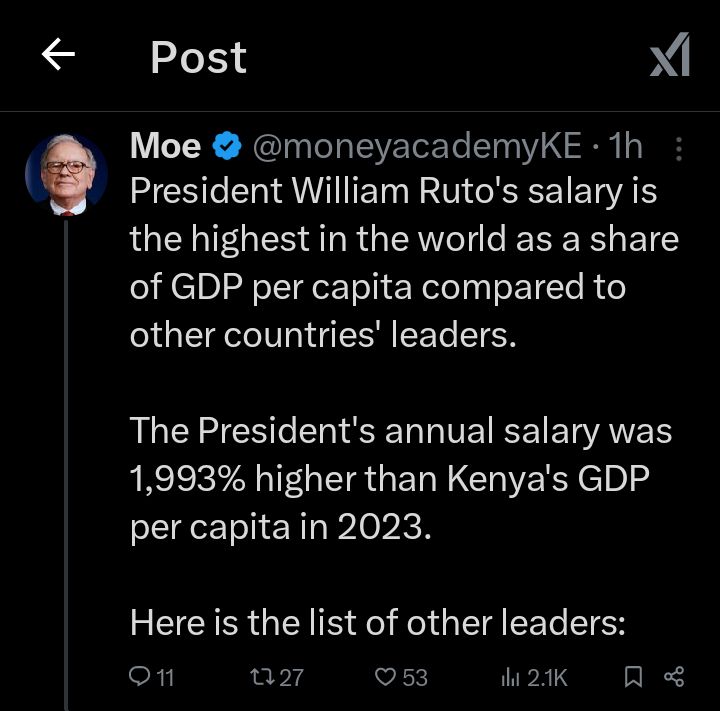President William Ruto’s salary has sparked widespread criticism due to its stark disparity compared to Kenya’s economic reality.
In 2023, Ruto’s annual salary was a staggering 1,993% higher than Kenya’s GDP per capita, making it the highest in the world in terms of a leader’s income as a share of the national average.
This figure dwarfs the corresponding ratios of leaders in countries with far better economic conditions, raising serious questions about his commitment to addressing Kenya’s pressing economic challenges.
For context, Singapore’s Lawrence Wong, leading a nation with one of the highest global standards of living, earns 1,158% above his country’s GDP per capita.

Tanzania’s Samia Suluhu Hassan follows with 1,087%, and South Africa’s Cyril Ramaphosa stands at 1,053%.
Even in these cases, these leaders govern nations where their citizens enjoy relatively better economic conditions and social services.
Yet, Ruto’s salary far exceeds theirs in a country grappling with poverty, unemployment, and rising living costs.
Critics argue that such an exorbitant salary is not only unjustifiable but also a slap in the face of Kenyans who are struggling to make ends meet.
The President’s earnings seem especially tone-deaf given the dire economic hardships many face, including skyrocketing prices for basic commodities, poor healthcare, and a heavily taxed population.
While other leaders like Anthony Albanese of Australia and Christopher Luxon of New Zealand maintain modest ratios of 584% and 566% respectively, Ruto’s disproportionate income paints the picture of a leader disconnected from the struggles of ordinary Kenyans.
This issue raises deeper concerns about governance priorities under Ruto’s administration.
While ordinary citizens bear the brunt of heavy taxation, including the unpopular housing levy, the President enjoys a lavish lifestyle funded by taxpayer money.
His government has repeatedly defended austerity measures, urging citizens to tighten their belts, yet these principles seemingly do not apply to those at the top.
The contradiction is glaring, leaving many to question the President’s sincerity in addressing economic inequality.
The exorbitant salary further tarnishes Ruto’s reputation as a “hustler” leader who rose from humble beginnings.
His promise to champion the cause of the common Kenyan appears increasingly hollow in light of his financial privileges.
Many now view his administration as one that prioritizes self-enrichment over national development.
The stark contrast between his rhetoric and actions has fueled public discontent and eroded trust in his leadership.
In a country where millions live below the poverty line, Ruto’s salary highlights the glaring inequality and misplaced priorities within his administration.
As comparisons with leaders of wealthier nations reveal, there is no justification for such an income disparity, especially when Kenya continues to grapple with immense economic challenges.
It is a glaring indictment of leadership that appears more focused on personal gain than the welfare of its people.
